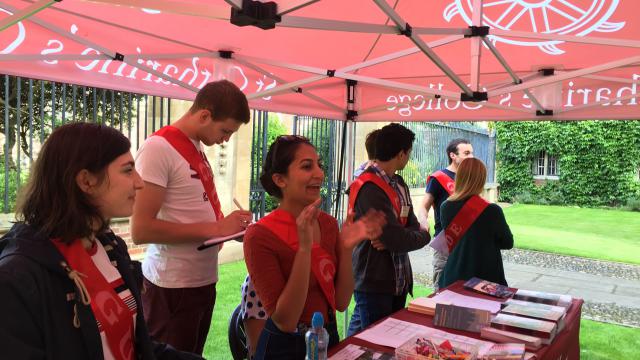
Accommodation options for undergraduates with disabilities
St Catharine’s is committed to supporting students with disabilities to have the same access to education as all others. As part of this, if a student’s disability means that substantial disadvantage could be alleviated by being allocated a particular type of college room, then it is sometimes possible to do this outside the usual ballot process.
In this context, ‘disability’ means a physical or mental impairment that has a substantial and long-term (over a year) negative effect on a student’s ability to do normal daily activities (see www.gov.uk/definition-of-disability-under-equality-act-2010).
We established a process with the intention of allocating rooms in a way which is
-
fair to all members of the student community we accommodate, and also
-
accounts for the constraints (legal, infrastructure) under which the College must work.
Offer holders should email the Admissions Office at the first opportunity, so they can outline their provisional needs to an admission tutor. You will have an opportunity to make a request relating to accommodation at the start of the allocation process which takes place soon after the release of UK A level results in August.
Students currently studying at St Catharine’s are encouraged to discuss accommodation needs with their tutor or a member of the Welfare Team in advance.
-
Current students should submit their requests via this webform by 31 January of the academic year preceding that for which accommodation is sought. This is to allow the College to take these requests into account before the main ballot process, which usually takes place later in Lent Term.
-
You can also email the Community Health Practitioner (health@caths.cam.ac.uk) if (1) you wish to submit medical evidence other than a Student Support Document or (2) you would rather explain your reasons for requesting a particular type of accommodation to them, rather than entering it on the webform.
-
We are flexible regarding the form medical evidence can take – it could be a Student Support Document from the University’s Accessibility and Disability Resources Centre, a doctor’s letter, or an excerpt from your downloadable medical records.
-
The Community Health Practitioner will review evidence emailed to them and it is not intended that it will be viewed by anyone else without your permission.
-
Because students’ situations change, and the accommodation offered each year varies, you need to re-apply for each year for which you wish to be considered outside the ballot.
-
The College will be more able to meet your needs if you request particular room features. We cannot consider requests for specific rooms, room sizes or rent bands.
All requests will be considered together by a group comprising the College’s disability tutor, the Community Health Practitioner, and the Head of Wellbeing.
A member of the Accommodation Team will also be present to provide information about which rooms might meet each student’s requirements.
We will inform you of the outcome before the main balloting process. The outcome will be either:
- You should enter the ballot as normal and review your concerns with your tutor
- You will be allocated a room outside of the ballot, based on your needs.
If, as part of this process, you are allocated a room outside of the ballot with a termly rent higher than the median rent of your college year cohort, then your rent will be reduced to that median termly rent level.
Such a reduction is only available to students who have applied to be accommodated outside the usual ballot process according to the process above. We cannot make retrospective refunds for previous years’ accommodation.
The following situations are not covered by the above process, so you should contact your tutor or a member of the Welfare Team as soon as possible.
- If you develop specific accommodation needs due to an acute illness or injury.
- Occasionally, students have compelling reasons for wanting a ‘long contract’.
If you experience financial difficulties as a result, you should discuss making an application for a College Bursary (or an alternative).




